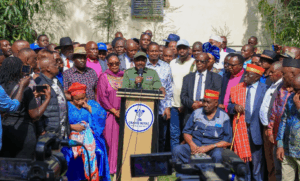Kenya and UAE Strengthen Climate Ties
The talks revolved around the Mangrove Alliance for Climate MAC and other opportunities for increased bilateral collaboration in climate finance.

Cabinet Secretary for Environment and Climate Change Aden Duale handshaking with United Arab Emirates Ambassador to Kenya H.E Dr Salim Ibrahim Alnaqbi. Photo by Aden Duale.
By Robert Mutasi
Cabinet Secretary for Environment, Climate Change, and Forestry, Aden Duale recently met UAE Ambassador to Kenya, H.E. Dr. Salim Ibrahim Alnaqbi to rev up environmental conservation and climate change.
The talks revolved around the Mangrove Alliance for Climate MAC and other opportunities for increased bilateral collaboration in climate finance.
Through successfully hosting COP28 in Dubai, the UAE has emerged as a global leader in climate action.
Over recent years, it has been at the forefront of a variety of environmental initiatives, and the MAC is no exception.
Launched at COP27 and co-led by the UAE and Indonesia, the MAC pursues the conservation and restoration of mangrove ecosystems as a nature-based solution to tackle climate change.
This is why Kenya is eager to join this initiative, which already involves countries like India, Sri Lanka, Australia, Japan, and Spain.
The MAC focuses on the restoration of mangrove forests, which are key in regulating the impacts of climate change. Mangroves form a sort of natural barrier against coastal erosion, storm surges, and sea-level rise.
They also store as much as ten times more carbon per hectare than terrestrial forests alone.
During the meeting, Duale assured Kenya’s commitment to environmental sustainability and the need for international cooperation in tackling climate change.
“Kenya is keen to collaborate with the UAE and other member countries of the MAC in restoring and protecting our mangrove ecosystems. It will not only enhance our resilience to environmental challenges but also contribute towards achieving global climate objectives,” he noted.
The UAE already seems to take the lead on matters related to climate change, especially with its long-shot initiatives on the promotion of biodiversity and nature-based solutions.
The MAC works to upscale conservation, restoration, and plantation of the mangrove ecosystem globally.
This will further amplify ecosystem services of mangroves, which include supporting marine biodiversity and shielding coastal communities from strong waves, erosion, and storm surges.
Kenya is likely to benefit in several ways through membership in the MAC, including getting climate finance and technical expertise from other countries that are members.
This cooperation is in line with Kenya’s wider environmental policy, with ambitious targets both for reforestation and the switch to renewable sources of energy.
In a world facing ever-growing manifestations of climate change, it is a platform like MAC that helps cement into place the thinking on the need for a collective approach and an involved international partnership.
The meeting between Duale and Dr. Alnaqbi could have no more promising premise than to help secure a fit-for-the-future Kenya and a fit-for-the-future world.





